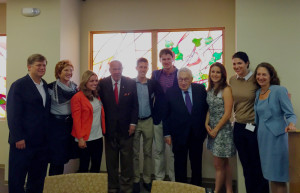
Winners of the 2015 George and Charlotte Shultz Fellowship for Modern Israel Studies were announced Wednesday morning during a breakfast reception at Hillel. George Shultz and Henry Kissinger, both former U.S. Secretaries of State, attended the reception, emphasizing the significance of conducting field study in Israel.
Shultz first delivered his congratulations to the newly announced fellows.
“The experience of being in Israel doing something is special,” he said. “Now is a particularly important time to go to Israel…When you’re there, you can’t help but feel the enthusiasm. But we do have serious problems over there.”
His remark was then echoed by Kissinger.
“Israel is now in a very dangerous situation,” Kissinger said. “The Iranian agreement ratified what has been going on for decades or so, the growth of Iranian nuclear power.”
They were referring to the recent nuclear framework agreement reached by Iran and six other countries, including the United States. The agreement would terminate the current sanctions imposed on Iran, provided that the country stops producing weapons-grade nuclear fuel under international supervision. In an opinion article co-authored by Kissinger and Shultz that appeared in the Wall Street Journal last week, they voiced concern that the agreement would “reinforce, not resolve, the world’s challenges” in the Middle East.
Kissinger believed that, especially at this particular time, studying in Israel would be “a human experience” that allows the students to better understand the actual situation there.
Four fellows have been selected this year, representing a variety of majors and academic interests. Three of them attended the reception and talked about their intended research projects. Ariella Axler ’15 is planning to investigate medical treatment to Syrian refugees in North Israel. Noam Rosenthal ’15 is heading for the Levantine gas field to research the anti-trust regulations concerning natural gas projects and their impact on Israel’s national security. Aaron Zelinger ’16 will be studying how corporations and countries under considerable geopolitical risk make decisions on natural gas export. Yael Wulfovich ’14, who also received the award, is currently studying abroad.
The selection process was based on the quality of each applicant’s submitted proposal, each of which was examined by a faculty panel, including professors Larry Diamond, Jeffrey Koseff, Abbas Milani and Richard Sassoon.
The Fellowship was established with the donation from Ann Friedman ’75 and her husband, Thomas Friedman, a New York Times columnist covering international affairs. Shultz later matched the donation, making it possible for Hillel to award a $5,000 stipend to each fellow. This year, Stanford’s Precourt Institute for Energy provided additional funding for a student interested in pursuing energy-related research in Israel.
As Stanford’s International Travel Policy prohibits any University-funded trips to countries where the Department of State has issued an official Travel Warning, including Israel, “these fellowships provide an important opportunity” for Stanford students interested in conducting field-trip research in Israel, said Rabbi Serena Eisenberg, executive director at Hillel, in an email to The Daily.
Michael McFaul ’86, professor of political science who directs Stanford’s Freeman Spogli Institute for International Studies and is former Ambassador to Russia, delivered the concluding speech. He talked about the Jewish community in Russia and answered questions on Russian issues.
Contact Qitong Cao at qitong ‘at’ stanford.edu.